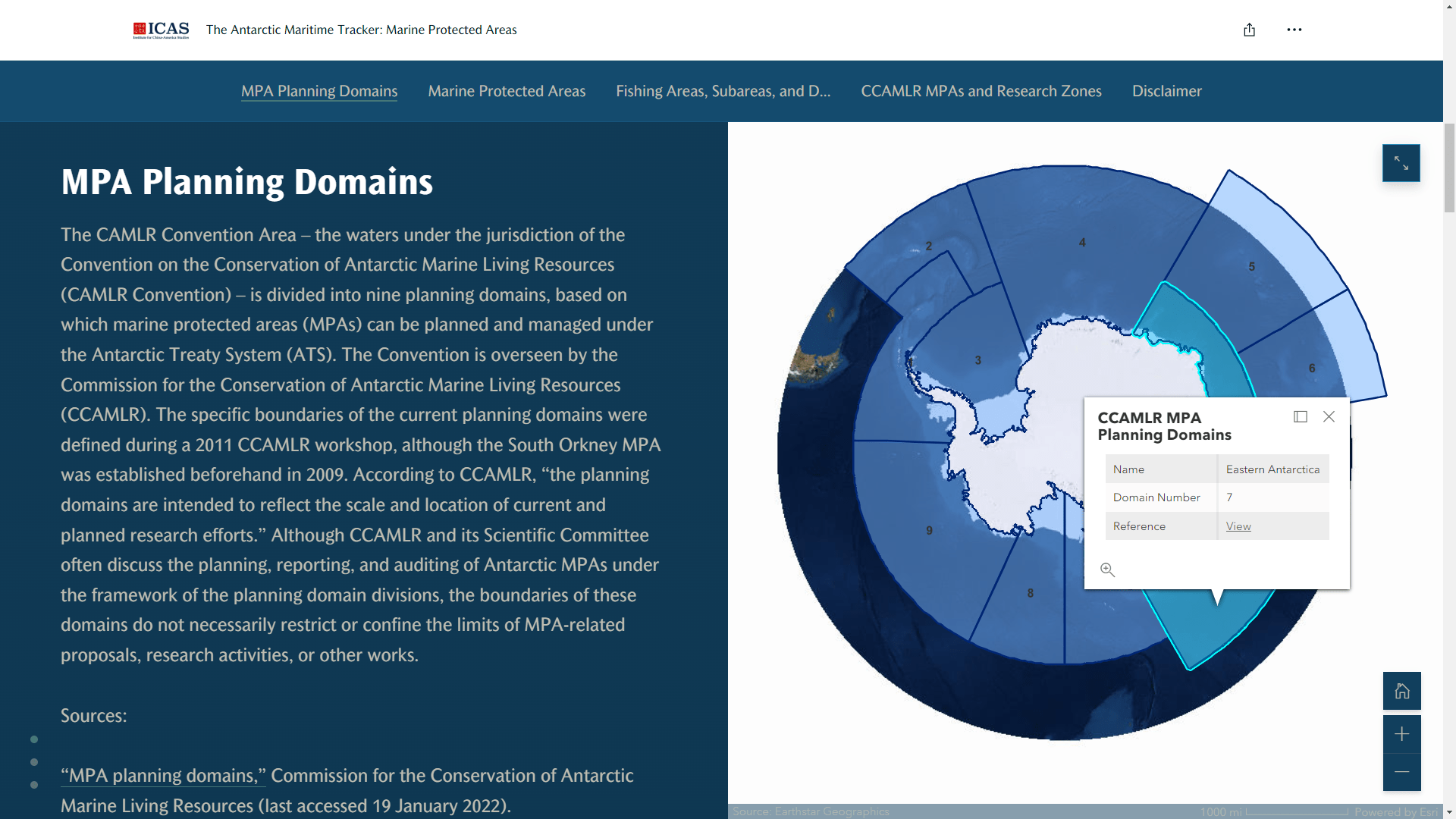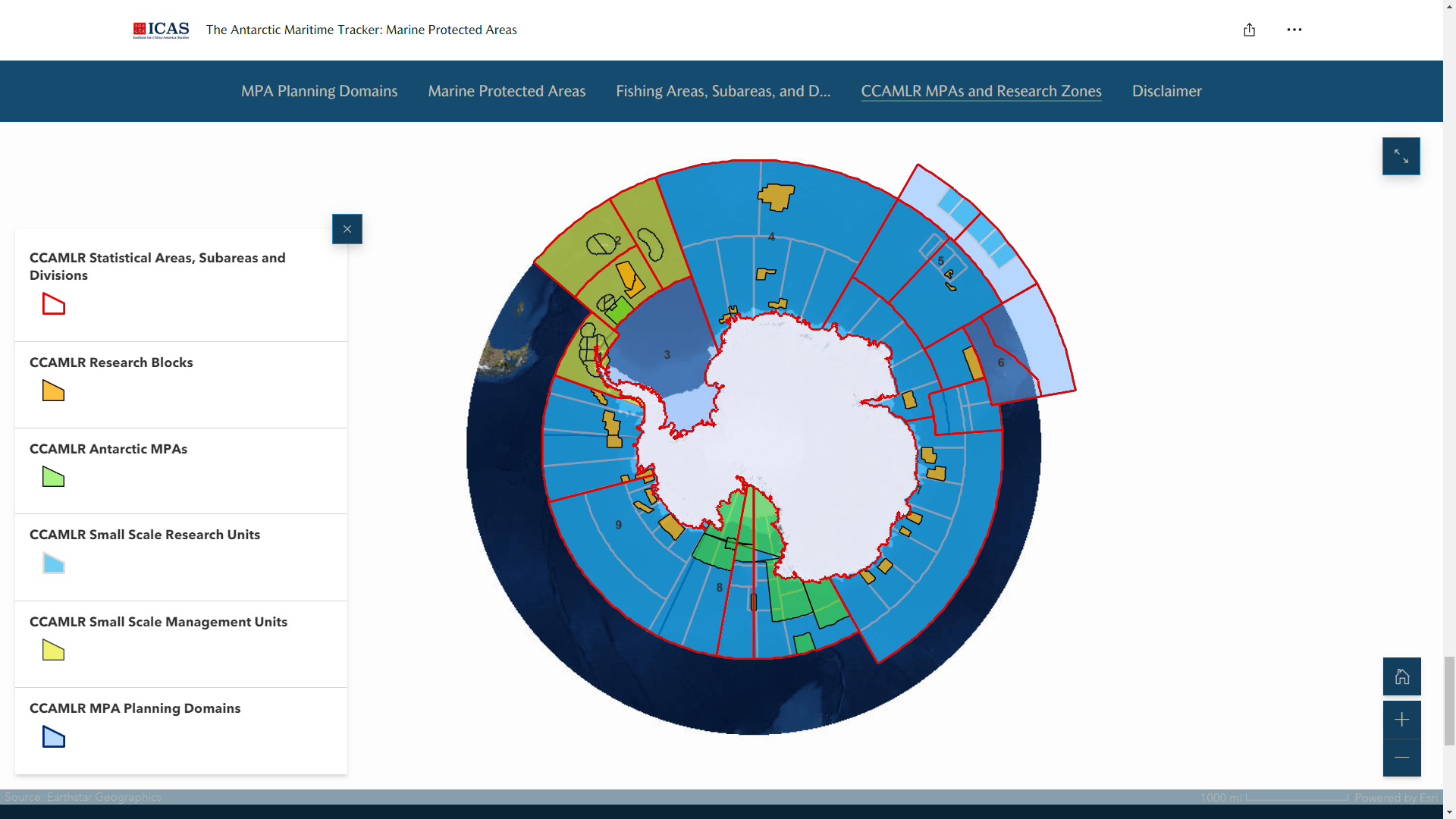
Executive Director & Senior Fellow
Head, Maritime Affairs Program
Cover Image Source: Gentoo penguins penguins on a stony beach on Danco Island (Antarctic Peninsula) with Quark Expeditions ship in the background in 2019. (Source: UnSplash)
The Commission for the Conservation of Antarctic Marine Living Resources (CCAMLR, hereafter referred to as the Commission) convenes meetings on a range of topics each year. This includes gatherings to discuss the establishment of Marine Protected Areas (MPA) in the Antarctic. In the 41st Meeting of the Commission, held October 24-November 4, 2022, three MPA proposals were brought to the meeting for discussion: Domain 1 MPA (Western Antarctic Peninsula and South Scotia Arc) submitted by Argentina and Chile; East Antarctic MPA submitted by Australia, the European Union and India, New Zealand, Norway, Korea, Ukraine, the United Kingdom, the United States and Uruguay; and the Weddell Sea MPA (WSMPA) submitted by the EU, Norway, Uruguay, Australia, the UK, New Zealand, the U.S., Korea, India and Ukraine. The Commission did not reach consensus on any of the three MPA proposals at this meeting.
The three proposals were supported by most members of the Commission. Russia and China expressed concerns, such as the need for baseline data collection and research and monitoring plans (RMPs) prior to the establishment of a MPA. The United States explicitly stated that it neither currently agrees with all the conclusions nor endorses all the recommendations made by China and Russia regarding MPAs and associated RMPs. The U.S. also called for attention being given to a more constructive dialogue on MPAs and RMPs in the future, starting with a Special Meeting in 2023.
While Russia and China share certain concerns on the three MPA proposals, it is less rigorous to come to a conclusion that Russia and China block plans for Antarctic marine protections. A review on China’s position on MPAs and its negotiation in the Commission meetings may provide a better answer as to why China is cautious in joining other members of the Commission in giving an easy ‘thumb up’ for the three MPA proposals.

A screenshot from one of the interactive ICAS Maritime Issue Trackers focused on ‘Antarctic Marine Conservation’ displaying and explaining the current MPA Planning Domains in the Antarctic region. Learn more context by clicking on each individual feature in this and other MAP Antarctic Trackers. (Credit: Institute for China-America Studies)
In response to the marine conservation goals set by the 2002 World Summit on Sustainable Development in Johannesburg, the Commission launched a series of discussions and workshops on MPAs in 2005. China acceded the Convention on the Conservation of Antarctic Marine Living Resources (CAMLR Convention) in 2006 and became a member of the Commission in 2007. China has always maintained a relatively conservative stance on the establishment of MPAs in Antarctica. During the negotiation in 2009, China supported the establishment of the South Orkney Islands Southern Shelf Marine Protected Area (SOISS MPA), but it also spoke out on that the MPA should not affect the legitimate rights of member countries to fish; in other words, it should not impact the right to rational use. In 2014, the Chinese delegation further elaborated its position, arguing that the current CCAMLR system is functioning well and the fishery resources in the area have not been threatened in any way.
In the 2015 CCAMLR meeting, China reiterated its support for establishing MPAs in accordance with international law and on the basis of scientific evidence, with the aim of enhancing the conservation of Antarctic marine living resources. China also recognized the positive revisions of the proposals on the establishment of a Ross Sea region Marine Protected Area (RSr MPA), initially proposed by the U.S. and New Zealand in 2012, and the East Antarctic Representative System of Marine Protected Areas (EARSMPA). However, it stated that its major concerns in relation to scientific and legal aspects of the proposals have not been addressed by the proponents.
Apart from the South Orkney MPA and Ross Sea MPA, the three MPA proposals under current negotiations within the Commission were reviewed in the following Commission meetings. At the Commission’s annual meeting in 2018, except for China, Russia and Norway, the remaining 22 members supported the three protected area proposals. In the 38th Meeting of the Commission in 2019, China pointed out that RMPs and review issues were raised during the discussion of the SOISS MPA from the very beginning, but it remained as an unresolved issue. China noted that the new provision of data and increased international collaboration in the East Antarctic MPA (EAMPA) proposal will improve the delivery of the science required to support Commission objectives. Australia noted that it valued China’s ongoing engagement with Australia in East Antarctica, including on the EAMPA proposal, and welcomed China’s plans to undertake research in East Antarctica and the potential future development of an MPA proposal in accordance with the objective and principle of the Convention.
On reviewing the proposal of Weddell Sea MPA (WSMPA), China presented its observations and comments on the scientific basis for the WSPMA proposal. These comments included a draft RMP and, with reference to a discussion in the Scientific Committee, reiterating points previously raised by China regarding scientific issues that remain to be addressed in the WSMPA proposal such as including an analysis on the mechanism and extent of the potential threats to Antarctic marine living resources. China considered how further work is still needed to be done in the Scientific Committee. On Domain 1 MPA, China recalled its concerns expressed at the Scientific Committee (SC-CAMLR-38, paragraph 6.57) and stated that the Commission’s leading role should be represented by the quality of the MPAs designated in order to give effect to the objective and principles of the Convention, rather than the speed, number and size of the MPAs.

A screenshot from one of the interactive ICAS Maritime Issue Trackers focused on ‘Antarctic Marine Conservation’ displaying the various CCAMLR-operated areas, domains and units in the Antarctic region. In 2021 and 2022, the Institute for China-America Studies Maritime Affairs Program (MAP) expanded its Maritime Affairs Tracker Project to include the Antarctic. (Credit: Institute for China-America Studies)
China’s attitudes towards the MPAs in Antarctica indicates that it appears to have taken a two-fold approach in Antarctic governance: conservation and rational use. Both of these approaches are well-reflected in China’s evolving position on the Ross Sea MPA. Its cautiousness on MPAs in the Antarctica is reflected in its involving position on the Ross Sea MPA and East Antarctica MPA. All Commission resolutions require consensus for approval. In October 2012, China agreed with Russia and Ukraine to oppose this proposal, as it believes that the scientific evidence is not solid enough to justify the creation of such large, restricted areas. In their views, in the absence of clear scientific analysis, “rational use” should gain greater consideration over “conservation” in any future agreement. Beijing also objected to the lengthy time period in which the proposed boundaries will be imposed ( 2064 for the Ross Sea and 2043 for the East Antarctic Reserve).
Another concern of China involves the management and enforcement of marine protected area restrictions. China does not yet have the capacity to consistently contribute to enforcement activities. That responsibility will fall on the United States and Antarctic territorial claimants, including New Zealand, Australia, Chile, Argentina and the United Kingdom. MPA enforcement could ultimately cause China to lose influence over maritime governance and put it at a distinct disadvantage if existing territorial claimants try to reassert their sovereignty over disputed regions.
The third concern is China’s global fishing activities. China’s distant water fishery activities have expanded rapidly since they first started in 1985, and it is now the lead country in terms of the world’s distant water fishery. Although China’s current fishing volume in Antarctica is not large, China still supports the development of the polar ocean fishery. Correspondingly, any MPA that prohibits fishing does not fully conform to the interests of China as a major fishing nation.
The Ross Sea region MPA was expanded as a result of inserting an additional zone, (Krill Research Zone), which was proposed by China and represented a compromise between China and U.S. reached in 2015. China agreed to the terms of the new Ross Sea MPA since it included a Krill Research Zone which reflects China’s long-standing view on the balance between conservation and rational use. The MPA was activated in December 2017 and will then be reviewed in 2052 with another consensus vote needed for a continuance.
With the investigation of Antarctic fishery and mineral resources and the development of tourism, the scope of human activities in Antarctica is also expanding. How to balance Antarctic environmental protection and resource development is still an urgent problem facing the Antarctic Treaty System. The focus should be on finding a balance between conservation and sustainable use rather than simply prohibiting or restricting the use of the ocean. China stated at the Commission’s annual meeting in 2015 that it supports the establishment of marine protected areas which should not hinder the freedom of scientific research in the Antarctic. Balancing the relationship between “conservation” and “rational utilization” requires a quantitative analysis of how to achieve a balance between “conservation” and “rational utilization” based on sufficient scientific data. However, there is a lack of corresponding basic data and a scientific indicator system in the existing practice of Antarctic marine protected areas, which makes the progress of the negotiations of the additional three MPA proposals difficult.
The conservation of marine resources based on the ATS requires the joint efforts of the international community. The protection of Antarctica is in line with the concept of “a community with a shared future for mankind” vigorously advocated by China. China will gradually support other MPA proposals on the premise of clarifying the relationship between conservation and rational use.

The Institute for China-America Studies is an independent nonprofit, nonpartisan research organization dedicated to strengthening the understanding of U.S.-China relations through expert analysis and practical policy solutions.
1919 M St. NW Suite 310,
Washington, DC 20036
icas@chinaus-icas.org
(202) 968-0595
© 2025 INSTITUTE FOR CHINA-AMERICA STUDIES. ALL RIGHTS RESERVED.
Diverging Currents: U.S.–China Strategies on Deep Seabed Mining and the Future of Ocean Governance